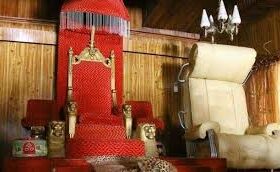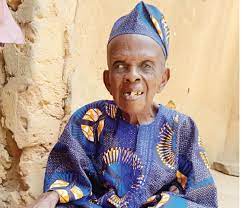The late Ashipa of Oyo, High Chief Amuda Olorunkosebi, was gruesomely murdered on November 26, 1992. His assailants were said to have twisted his neck and poured acid in his mouth to be sure he was dead because they believed he could rise up again.
The killing triggered tension in Isale Oyo and the corpse was not buried for seven years. One of Olorunkosebi’s children, Olaosegba, recounts his last moments with his father and his father’s relationship with the late Alaafin of Oyo, Oba Lamidi Adeyemi
How old were you in 1992 when your father, High Chief Amuda Olorunkosebi, was murdered?
I was about 27 years old then. I was observing the one-year mandatory national youth service at the time. That was about 30 years ago.
How did you receive the news of his killing?
I was shocked and the killing was painful and it is still painful even till now.
Can you recall your last interaction with him before his death?
I saw him two days before the incident. He was killed on a morning; it was a great shock. I was with him on a Tuesday night and he was gruesomely murdered on Thursday morning. There was no access to telephone like we have now when the incident happened so, I was told the following week. They sent someone to me to call me from where I was serving. He (my father) was to attend the graduation ceremony of one of his daughters at the Technical College and he had also planned to attend the naming ceremony of a child of one of his brother’s the same day at Ijawaya but he was killed. He had two ceremonies to attend on the day he was murdered. The whole family, residents of Oyo town and even those outside Oyo were pained by the killing. It is a great pain and only the Lord can heal the pain.
Where exactly was he murdered?
He was lured to the place where he was killed at Ijawaya Ashipa village. He had a fish pond but that was around Oyo town at Ajegunle area.
Who were the people that lured him to the place?
That is where the law is an ass. They said if you want to prove murder cases, it must be proved beyond circumstantial evidence. That ‘what and what’ someone does to kill must be established before such suspects can be nailed. Many were left off the hook during the investigation. But around 1997 or 1998, two of those arrested were jailed. The court held that they were accomplices but could not prove that they actually killed him (my father). The court said the late Alaafin sent them on an errand. A note, which was one of the exhibits, was tendered before the court. The note was hung on the door at the Idi Isin Quarters of the Alaafin.
What was the content of the note?
I can’t recall it but Alaafin sent those two people on an errand and they were asking for their fee. They said he neglected them and refused to pay them for carrying out that particular act. Anyway, a judgement was given and they were sent to seven years’ imprisonment. One of them is an ophthalmologist or he had something to do with the eyes. He followed the Alaafin to the United Kingdom within that same year Ashipa was killed. It was proved in court. The car they used to trail him to where he was killed was imported and the car should still be at the Oyo State High Court up till now. It was there for many years. The car was brought into the country by one of Alaafin’s companies.
But people believed that Ashipa had spiritual powers and he could not be killed just like that. Was he a spiritually powerful person?
What will you say of somebody like the late Chief Gani Fawehinmi? Did he also have such powers? When you are fighting on the side of the oppressed, God has a way of protecting you but people will think that such protection is conferred by juju but God is the most powerful one. He (my father) was a devout Muslim.
So, you are saying he did not have juju which some call African insurance?
He trusted in God. He did not abhor other religions and on some occasions people would come and pray in his palace and he would join them. He also used to attend churches but as a Yoruba man, he could have a way of protecting himself. But I can’t say.
Is it true that Ashipa always antagonised Oba Adeyemi?
No, but he always tried to stop excesses. For example, he didn’t allow the Alaafin to take possession of lands that did not belong to him. He would stand against that. He did that on many occasions; he did not want people to be cheated. He would challenge such acts of oppression in court.
Did he challenge Oba Adeyemi in court on many occasions?
Yes, he did but I don’t know how many times.
He challenged the Alaafin on the choice and installation of the late Chief MKO Abiola as the Aare Ona Kakanfo of Yorubaland. Do you know why he did that?
Yes, he did that. He raised some vital questions on his rights concerning that chieftaincy title. That case came up the week Abiola was to be installed as the Aare Ona Kakanfo. Judgment was delivered on a Friday, a day to the installation ceremony. That was the only time he confronted the Alaafin. Before then, it was the Alaafin that was giving him problems and challenging him. Alaafin removed him from office as the Ashipa in 1978 but he was reinstated around 1981. It was the Alaafin that was causing trouble and like the time the talking drum bequeathed to him by his ancestors was removed from his (Ashipa) palace and some other things like that. But he stood his ground despite all those troubles and that was why he (Alaafin) said my daddy was stubborn. They believed that if he was not taken out, they might not have peace; so he was eliminated.
What grouse did he have against Abiola’s installation as the Aare Ona Kakanfo?
He said as Ashipa and being one of the Oye Mesi, he had a role to play in the installation of the Aare Ona Kakanfo but the Alaafin did not carry him along. Perhaps Alaafin sidelined him because he believed Ashipa was always challenging his authority. But that is not true.
The issue is that the progenitors of the Ashipa were the real founders of the present Oyo town and not Atiba who was also there. The present Oyo was formerly known as Ago Oja, when it was established. Oja himself was the one who headed the settlement then and he was called Baale. Oja was a warrior and a hunter. He was killed in a particular war – I think the war of Kanla. His brother, Elebu, became the Baale after him. Atiba happened to be a stranger in the place but he married the daughter of Oja. It was when Atiba was going to Ijaye to see his brother that he stopped at Ago Oja and spent some days and Oja sent some of his warriors to follow him to Ijaye to see his brother. When he got to Ijaye, his brother was threatened and said two princes could not be in the same town, so he asked him to go to his in-law’s place at Ago Oja to stay with him. Oja allowed him so that he too would be seeing his daughter.
By that time, Oyo Ile had been scattered and they settled in about eight places before this present one. But Oja was warned by the priest and his brother that he should not allow Atiba to stay with him at Ago Oja. Unfortunately, he became another troublesome visitor. He started a war later and Oja was killed in the war while his brother was also killed in another war. What I am saying is in a book, Ago Oja. The third person became the Baale but he was not as powerful as his elder brothers. That was when they were trying to re-establish Oyo Ile and that was how Atiba became the Alaafin at Ago Oja which is now known as Oyo. Atiba changed the title of Baale of Ago Oja to Ashipa. And that was how Atiba became the head of the town.
So, we can say Atiba was the first Ashipa then?
Yes, he was the first Ashipa. The name of the town was also changed from Ago Oja to Agodoyo. Later Ago was removed from it and the town became Oyo. I always query it whenever they call this place Oyo Alaafin. It should be Oyo Oja. The title of Ashipa was changed by a committee during the tenure of former Governor Adebayo Alao-Akala to Alago Oja. The late Alaafin had already removed Ashipa from the Oyo Mesi.
But is Alago Oja not part of the Oyo Mesi?
No. They now maintain their Baale status.
Is the person now occupying the stool from your lineage?
Yes.
Will you be interested in becoming Alago Oja when the stool becomes vacant in the future?
That is left to God. We are in God’s hands.
It was said that Ashipa was not buried immediately after he was murdered. For how long were his remains left unburied?
Seven years. He was gruesomely murdered on November 26, 1992, but he was buried either November 26 or November 27, 1999. It took us seven good years. It was after the civil rule started in 1999 that he was buried.
Why was the body kept for that long?
We were waiting for justice to be served.
Did Alaafin visit your family when Ashipa was killed?
No, he didn’t.
Will you say your father offended Oba Adeyemi in any way?
I don’t think so. About two weeks before he was murdered, Ashipa went and prostrated before the Alaafin during a programme at the Atiba Hall. But he snubbed him; it was in the presence of everybody in the hall. He went to the hall and prostrated before him as a show of respect despite that the Alaafin had banished him from the palace then. That showed his humility and the deep respect he had for the Alaafin despite the unkind treatment he got from Alaafin.
So, you think it was Oba Adeyemi that offended Ashipa?
He offended Ashipa seriously.
But did your family forgive Oba Adeyemi before he died?
You know forgiveness is very key in the Bible. The Bible says if you do not forgive others of their trespasses, your heavenly Father won’t forgive you of your own trespasses too. It was very painful but we tried as much as possible to put it away from our minds.
Is there a possibility of people from your family marrying people from Oba Adeyemi’s family?
That is left to God.
How old was your father when he was killed?
He was over 70 years old. He was older than Oba Adeyemi.
Will you want the case to be reopened for fresh investigation?
Sure. Even the judge who presided over the matter in 1994 said the last had not been heard about the case. I know one day somebody will pick it up and reopen the investigation. I believe a thorough investigation will be carried out either by a private investigator or the government to uncover those who masterminded the murder and those who executed the plans. It was a terrible act. Look at the killing of the late Chief Bola Ige of blessed memory and they are yet to fish out the killers but we believe that it will be done one day.
What fond memories of your father do you have?
I have a lot of such. He was such a humble person. He fought the cause of the oppressed and he was a giver. I remember there was a time one of the Togolese farm labourers held the christening ceremony of his son, Baba (my father) went to his village, despite the very far distance. He did not consider anyone too low to relate with. That was why the Isake Oyo people refused to bury him. We had to later say they should allow him to be buried so that he could rest. That was why it took a long time before he was finally buried. He was not an oppressor, he did not use his power to take what did not belong to him. He was not a fraudster like some people who would sell one land to seven persons. He was a very cool man that was ready to help. He gave scholarships to many students, including those not from Oyo. When Alaafin died many people in Oyo were just saying, “Eh-en, eh-en.” You know what that means? There is a quarter called Alagutan in Oyo, many people rejoiced openly there when Alaafin died. Oyo town did not go into mourning when he died and I am telling you the truth. But one must mourn the dead and that was why I didn’t say anything until after the eighth day. But I don’t think they did that when my dad was killed.
My father was killed in a gruesome manner.. it was dastardly done. They overpowered him, twisted his neck and poured acid down his throat. When the coroner was explaining how he was killed in the court, he wept. Nobody should die like that. But everything is in the court of God now, all of them would have appeared before their creator. He is the only one who would determine which side each of them would go to.
But one message I want to pass across to the people is that we should be mindful of the kind of life we live because our names, whether good or bad, will transcend generations. There is no place I go and people won’t ask me if I am related to Amuda Olorunkosebi of Oyo. Thirty years after his death, people still ask me that question. There was a time I travelled to South-East and I went to court to swear to an affidavit and somebody asked if I was Ashipa’s son. It surprised me that he (my father) could be known in the East. So my point is that a good name is better than riches. Things will unfold just like it is written in the Bible concerning Ahab: “Now the rest of the acts of Ahab and all that he did and the ivory house which he built and all the cities which he built, are they not written in the Book of the Chronicles of the Kings of Israel?”
Your father was a Muslim, are you a Christian?
Yes, I became a Christian in 1991.
Source: PUNCH Newspapers











Leave a Reply